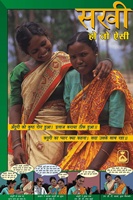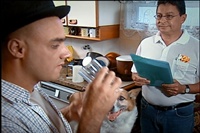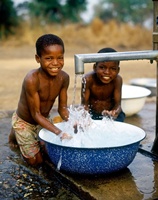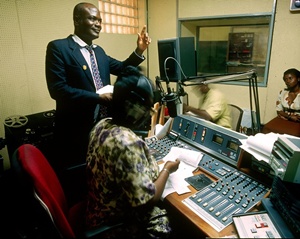Roy Head left the BBC World Service Trust in 2005 to found Development Media International (DMI), with the aim of building capacity to run public health campaigns in developing countries. That same year, he was given the Visionaries Award by the Joseph Rowntree Charitable Trust. Now, with funding from the Wellcome Trust and Planet Wheeler Foundation, DMI is all set to embark on a five-year scientific study in Burkina Faso. Caroline Hartnell talked to him about why he set up DMI and how being part of the Visionaries scheme helped him get to where he is now.
Can you briefly explain what the overall aim of DMI is, and the theory behind what you’re trying to do?
Our objective really is to save as many lives as we can through public health campaigns. Mass media is just a tool – it’s a convenient way of getting to lots of people. What’s really important here is human knowledge. If you’ve got a mother whose child has got diarrhoea, who’s giving it food and water and it’s just going straight through, she may automatically assume that she’s causing the diarrhoea. So she stops giving the child food and water, and of course it then dies, so she’s basically killed her child. It seems to me a human right that mothers should know that doing this will lead to the child dying of dehydration. Mass media is an efficient way of passing on that information.
A lot of our work is based on a child survival series that appeared in The Lancet in 2003. At the time 10 million children were dying every year, and what that series determined was that two thirds of those lives could be saved with existing basic interventions – a third of them with things that are generally available in households. And that is entirely dependent on human knowledge. That’s 3 million lives that could be saved just by taking simple measures in the household like breastfeeding, giving children food and water when they’ve got diarrhoea, that sort of thing. And another third could be saved by giving kids simple treatment, like antibiotics for pneumonia or anti-malarials for malaria. In those cases, our job is to get people to recognize the danger signs and encourage them to go to a health centre for prompt treatment.
What we’re trying to do is be a one-stop-shop for that information. Too much campaigning energy has gone into focusing on single diseases that the world wants to eliminate – AIDS is a good example. The problem for us is that the world spends millions on AIDS campaigns and yet things like diarrhoea and water purifying are just ignored.
How will you achieve your aims?
We plan to work through the public health departments of governments and build their capacity to run media campaigns for all the important diseases. These will differ from country to country, so we will need to provide them with a way of working out how much effort they should allocate to each one. In many countries in Africa the health communications department of the ministry of health is one individual in a dark corner of the ministry building, with the chance to produce a leaflet maybe twice a year. Our ambition is to transform that into a department of maybe 10 or 12 people that can do this work in a cost-effective but comprehensive way.
How will this work be funded – by individual countries or external donors?
We’ve never done a campaign that’s funded by an individual country. That’s not to say it’s not possible, but it’s never happened to us. All the funding comes from external donors. They give us the money and we go in and do the work. The idea is that when we show them results, governments will then carry it on. That’s never been achieved before – building sustainable public health and communications capacity is really the holy grail. This is what we’re hoping to build in Burkina Faso and elsewhere. We want to roll this out over several countries.
When you set up DMI, did you already have experience of running public health campaigns?
I started with the BBC World Service Trust back in 1997. Before that I’d been a TV producer, and I worked for the UN for four years, running a radio station in Cambodia and a TV operation in Yugoslavia. I went to the BBC and WHO at the same time to tell them that I felt we could do something to professionalize health communications. We basically added a health communication department to the BBC’s existing charity, and it became the BBC World Service Trust. Through them we ran about 15 or so campaigns, on things like leprosy, AIDS and trachoma.
 I built up some of the methodology during that time, but found it in a way rather unsatisfying. If you sort out one disease, one country at a time, it’s going to take a very long time to change things, and I felt we could do a lot more. For example, when we did our first campaign for leprosy in Nepal, we had 12,000 people treated. The ministry of health thanked me afterwards and said ‘now can you do diarrhoea?’ And I had to say no because we didn’t have any funding, and funders weren’t thinking in this broad systemic way. At that time there had been a big drug donation from a Japanese foundation, so it made sense to do leprosy campaigns then and to make people aware that a cure was available. (Pictured is a poster that was used in DMI’s leprosy campaign in India.) It was a good thing to do and I’m glad we did it, but the frustrating thing is that what we’re doing should be part of health systems; it should be built into government, not something that’s externally funded forever. One of the objectives of our current work is to demonstrate, not only to funders but also to governments, that it’s worth spending money on.
I built up some of the methodology during that time, but found it in a way rather unsatisfying. If you sort out one disease, one country at a time, it’s going to take a very long time to change things, and I felt we could do a lot more. For example, when we did our first campaign for leprosy in Nepal, we had 12,000 people treated. The ministry of health thanked me afterwards and said ‘now can you do diarrhoea?’ And I had to say no because we didn’t have any funding, and funders weren’t thinking in this broad systemic way. At that time there had been a big drug donation from a Japanese foundation, so it made sense to do leprosy campaigns then and to make people aware that a cure was available. (Pictured is a poster that was used in DMI’s leprosy campaign in India.) It was a good thing to do and I’m glad we did it, but the frustrating thing is that what we’re doing should be part of health systems; it should be built into government, not something that’s externally funded forever. One of the objectives of our current work is to demonstrate, not only to funders but also to governments, that it’s worth spending money on.
Were you still at the BBC World Service Trust when you heard about the Visionaries Award?
 No, I had already left. I felt like I needed to do something different; to do what we were doing in a more efficient way. I’d already set up DMI and then I heard of Joseph Rowntree Charitable Trust’s Visionaries scheme. At that stage, we were looking at a tuberculosis campaign in Brazil (pictured), but it was still just a gleam in my eye at that time. We were having discussions with USAID about doing it and then I found out about Visionaries.
No, I had already left. I felt like I needed to do something different; to do what we were doing in a more efficient way. I’d already set up DMI and then I heard of Joseph Rowntree Charitable Trust’s Visionaries scheme. At that stage, we were looking at a tuberculosis campaign in Brazil (pictured), but it was still just a gleam in my eye at that time. We were having discussions with USAID about doing it and then I found out about Visionaries.
Tell me about the Visionaries Award. What did you hope to get out of it?
I think I got the grant because I used the expression ‘one country, one disease at a time, is too slow’. I knew we needed to roll out something in a faster, more efficient way. At the time I thought that we needed to do short, sharp capacity building – go into a country, train them up and then let them get on with it. The more I looked into it, the more I realized that wasn’t actually going to work that well and we had to do something more substantial. It takes years to build capacity.
After they gave me the grant, the first six months were spent thinking about the product – what’s going to make the big difference. That’s when I came to the conclusion that we needed to work country by country but tackling all diseases at once through a big three- or four-year project.
The JRCT grant gave me a salary for five years and some expenses as well, and it completely freed me up. There were no conditions, I didn’t have to produce anything. I could just think about what I said I was going to develop. Their approach to me was entirely supportive, there was no element of judgement or even need for delivery. The only thing we had to produce was an annual four- or five-page update on what we had been doing.
It felt odd because my usual way of working is very much results-driven – I could show you a whole host of graphs, and I’ve used the phrase ‘if it’s not measurable it’s not worth doing’ a hundred times! Their approach, which was just to be nurturing, certainly didn’t fit with what I’d come to see as development. But actually I’ve never worked harder in my life!
When did you first get in touch with the Wellcome Trust?
A couple of years later I presented our big idea to the Wellcome Trust. I showed them what we’d done with leprosy and blinding trachoma, showed them charts and so on, and asked for money to do these campaigns in a more comprehensive way, as I’ve described. They replied by asking how many lives I could save.
I had no idea, really. They said they liked what we were doing and were excited about it, but they’re science funders and they wanted to know a number. That’s how epidemiologists think. They’re much less impressed by intermediate indicators such as behaviours or knowledge; what they really care about are those hard indicators, the end points. That’s how public health scientists think and I think they’re right to think like that. But somehow we had to fit into that framework.
It was a huge task – I didn’t know the scientific world and I needed steering. Richard Horton, editor of The Lancet, helped me, and so did Jimmy Whitworth, international director of the Wellcome Trust. He also pushed me towards the London School of Hygiene and Tropical Medicine, where I met Simon Cousins, who is professor of medical statistics and particularly respected for his work on child epidemiology. And later we worked with Anne Mills, who’s perhaps the world’s best known health economist. It was wonderful because I had all these tutorials in the very basics of epidemiology from all these people who were leaders in their field. At the same time we were building a statistical model to work out how many lives could actually be saved.
I worked pretty much full time on this sort of stuff for nine months. It was time-consuming, and I wasn’t sure it was going to get anywhere, but it felt like the sort of work I was born to do. But I would never have had the opportunity to do that without some kind of unconditional funding – the Visionaries award allowed me to do it. I didn’t know it was going to lead to the results that the model predicted.
What did you learn from your intensive nine-month study of epidemiology?
 Our previous results had only told us that we could get people to a health centre to get treated for a drug or a disease, or get kids to wash their hands (pictured is a scene from a washing campaign in Tanzania), or get treatment for leprosy. But they didn’t tell us that we were saving any lives at all, and Wellcome wanted to know how many lives we could save and the cost per life saved or life year saved. That’s the standard method that epidemiologists use to compare the cost of different interventions, like building a hospital or public health centre, or giving out drugs, mosquito nets or immunizations. How do you compare apples with oranges? Anne Mills’ great work has been to measure this sort of thing.
Our previous results had only told us that we could get people to a health centre to get treated for a drug or a disease, or get kids to wash their hands (pictured is a scene from a washing campaign in Tanzania), or get treatment for leprosy. But they didn’t tell us that we were saving any lives at all, and Wellcome wanted to know how many lives we could save and the cost per life saved or life year saved. That’s the standard method that epidemiologists use to compare the cost of different interventions, like building a hospital or public health centre, or giving out drugs, mosquito nets or immunizations. How do you compare apples with oranges? Anne Mills’ great work has been to measure this sort of thing.
Our research told us that we could expect to prevent about 15 per cent of all child deaths. It also told us that what we were doing was extraordinarily cost-effective. Before we did this work we had no idea whether our stuff was cheap or expensive. A couple of million pounds per year for a healthcare campaign sounds pretty expensive to me but it turned out that this is actually among the cheapest public health interventions, if our model is right. The cheapest health intervention that the world has invented is childhood immunizations – these cost about $8 per life year saved in Africa, $16 in Asia. Our project seems to fall somewhere between $1 and $9, so we’re at the absolute cheapest end of all public health interventions.
Overall, we reckon that if we were able to implement these campaigns in ten countries over ten years we could save over 2 million lives.
So what happened when you took your results back to Wellcome?
They were impressed by what we’d done and said they were seriously interested in funding us. Then we had to apply for the grant formally. Wellcome’s primary interest has always been in research, so they said they would fund the research element and the management as long as we found another funder to support the actual media campaign. So we had roughly half the funds in the bag, but conditional on us finding another funder.
 At this stage we had identified Burkina Faso as the place we wanted to start our work. We need a country where we can isolate pockets of population, and there’s almost no other country where it would work. We want to use FM radio as our medium, and the wonderful thing about Burkina Faso is that the national radio isn’t the dominant medium. The real power there is with local radio. That means we can do a randomized trial, running campaigns in some parts of the country but not others. If you compare this with the UK, you could do a campaign on local radio but if everyone’s listening to national radio, like Radio 4 or Radio 1, then you lose most of your horsepower.
At this stage we had identified Burkina Faso as the place we wanted to start our work. We need a country where we can isolate pockets of population, and there’s almost no other country where it would work. We want to use FM radio as our medium, and the wonderful thing about Burkina Faso is that the national radio isn’t the dominant medium. The real power there is with local radio. That means we can do a randomized trial, running campaigns in some parts of the country but not others. If you compare this with the UK, you could do a campaign on local radio but if everyone’s listening to national radio, like Radio 4 or Radio 1, then you lose most of your horsepower.
There was a point at which we thought we weren’t going to find that extra funder. We tried about a hundred other funders but it was tricky because Burkina Faso is not on the radar screen for major funders like the Gates Foundation, USAID or the UK’s Department of International Development – geographically it’s not people’s priority. That was also an advantage for us – there weren’t many media campaigns running there, so it was almost virgin territory. As we applied to foundation after foundation, it became clear we were going to have to look beyond the obvious candidates and find somebody whose grant-giving policies weren’t set in stone.
At this point my colleague Laura Smethurst contacted the Planet Wheeler Foundation and we had some chats with them but we had no idea whether they were seriously interested. We had some long discussions with their trustee Mark Cubit, who’s very impressive, and really got his head around all this science. Later on we met Maureen and Tony Wheeler, the Lonely Planet founders who started the foundation. Again, they were really engaged with the subject matter and we had a great meeting with them. They told us there and then that they liked our ideas and were going to give us some money, but we had no idea they were going to give us the lot. When I got the call I was astonished – I had pictured the search going on for another couple of years, but in the end it only took about six months.
So now you’re ready to go. How long is the trial?
It’s a five-year project, which starts this month. The idea is that if our predictions are right – ie we reduce child mortality by 15 per cent, and do it at a cost as low as or lower than any existing health intervention – that should be an irresistible draw for governments, funders and health campaigners around the world. A couple of million pounds per year is a significant amount of money but if you can prove those returns then you’re in business.
Would this have been possible without the Visionaries Award?
Not in a million years. I couldn’t have afforded all that ‘time out’ to do the intellectual work to construct the model. From the first meeting with Wellcome to the agreement of the grant took about three years, so the JCRT grant was crucial in keeping me going over that period. I also couldn’t have done it without that external stimulation from Wellcome, pushing me to bring the media and scientific sides together. That was the major intellectual leap.
This new grant now means that we have the opportunity to staff DMI properly. You can’t run these big ambitious projects without a proper solid organization underneath you, and that’s what we’ve now got the chance to build.
Media and development is one of the most unprofessional fields you’ll ever see – often people just broadcast things and cross their fingers. Often people don’t bother to measure results at all. And that’s just wrong. Every penny we spend on media could be spent on nurses or medicines, so we have to justify this. And because of this research grant we’re now able to apply the most rigorous possible measurements. Measuring the actual number of lives saved is about as solid a measure as you can get. Whether a child lives or dies is a binary measurement, there’s no fluffiness in that. So we’re going to know whether this works, once and for all…
For more information
http://developmentmedia.net
http://www.jrct-visionaries.org.uk/default.asp
http://www.wellcome.ac.uk
http://www.planetwheeler.org
Contact Roy Head at roy@developmentmedia.net


Comments (0)